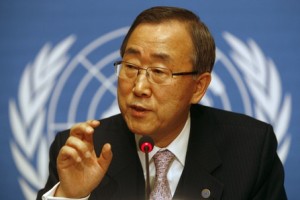UN Bureaucracy To Push “LGBT Rights” Despite Tensions
 UN Secretary General Ban Ki-moon promised that homosexual and transgender rights would advance at the United Nations despite the strain it will cause within the organization and between states.
UN Secretary General Ban Ki-moon promised that homosexual and transgender rights would advance at the United Nations despite the strain it will cause within the organization and between states.
“Mostly I have not been successful,” Ban Ki-moon lamented, while recounting episodes from his “personal diplomacy” to promote lesbian, gay bisexual and transgender (LGBT) rights worldwide.
The outgoing Secretary General spoke to an adoring audience of delegates and advocates at UN headquarters on Tuesday during a special event on the sideline of the General Assembly.
Departing from prepared remarks, he explained that his relationship with powerful UN member states had been made “difficult” because of his frequent and insistent advocacy for LGBT rights.
But Ban, now in his final year in office, brushed aside any concerns about losing political good will.
“This is not just a personal commitment, it is an institutional commitment,” he said, promising that he would “continue to fight” and that he would be the “first of many” Secretary Generals to take up LGBT rights, as part of the UN’s “sacred mission” to promote human rights.
He said he “learned to speak out” for LGBT rights at the UN, because in Korea he was not allowed to.
As a result of his advocacy, he said, Malawi’s president pardoned a convicted homosexual couple. Years ago, he promised 12 “closeted” UN staff members that he would make the UN the “best possible place for LGBT people to work.”
The event, “Leaving no one behind,” was hosted by the “LGBT Core Group,” comprised of 17 countries that account for over 75% of the UN budget, and the European Union.
The group has been unable to gain their desired political support. The Sustainable Development Goals adopted last week had to be “sanitized” of any reference that could be interpreted to include LGBT rights. Nevertheless, advocates promise to get countries and UN agencies to re-interpret the goals’ broad language.
The event was accompanied by a declaration from 12 UN agencies,* including the World Food Programme, the UN Children’s Fund, and the UN Refugee Agency, telling countries to repeal laws that criminalize “same-sex conduct between consenting adults,” prohibit any discrimination against individuals who identify as LGBT, legally recognize sex change in identity documents, and “combat prejudice” through “dialogue, public education and training.”
Other speakers targeted Africans for criticism.
Festus Mogae, former president of Botswana, made a plea to African countries.
He called “same-sex sexual activity” the “most basic of rights,” and quoted Mother Teresa on human rights as support for this cause. LGBT rights are crucial to fight AIDS in Africa, he said, although he neglected to address how HIV/AIDS among men who have sex with men, which has reached epidemic proportions in developed countries, could be controlled in Africa if homosexuality became mainstream.
The Dutch vice-president of the EU commission, Frans Timmermans, said Africans “should get in touch with their culture and history,” and apologized on behalf of Europe for having brought “homophobia and discrimination” to Africa.
Timmermans praised the Secretary General for his “extraordinary fidelity” to LGBT rights and said, “We are not here to impose our views on anyone who does not share them.”
Hina Jilani, a former UN designated human rights expert and member of the Elders, cheered LGBT advocates. “You can’t defeat them and they will never be defeated, that’s what gives me hope, more than any international treaty respecting the rights of LGBTI.”
*The signatories are the International Labor Organization (ILO), The UN human rights bureaucracy (OHCHR), the UN Development Program (UNDP), the UN’s education, science and culture agency (UNESCO), the UN Population Fund (UNFPA),
the UN Refugee agency (UNHCR), the UN Children’s Fund (UNICEF), The UN office for drugs and crime (UNODOC), the UN Women’s agency (UNWOMEN), the World Food Program (WFP), the World Health Organization (WHO) and the UN Aids program (UNAIDS).

